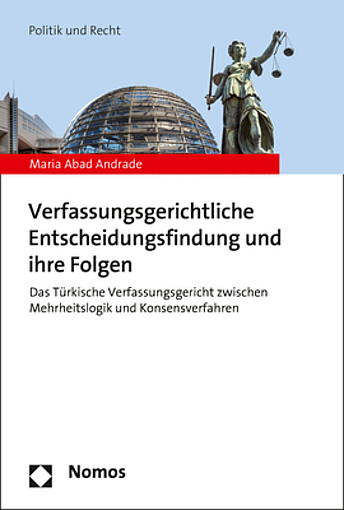englischHow do constitutional courts decide and how do institutional factors affect decision-making processes and their outcomes? This book answers these questions—in a way that is relevant for law and politics—in two steps. In the first place, it develops possible theoretical models of constitutional courts’ decision-making. Thereafter, they are applied to the politically significant Turkish Constitutional Court (1962–2012) for the first time. Using interviews with former judges and analyses of court rulings, the author proposes that ‘unfavourable coupling’ takes place at the Turkish Constitutional Court in the form of a decision-making logic that follows majority principles combined with a process that requires a willingness to compromise and seek consensus for the court to function appropriately. This coupling affects the court’s decision-making process, its case law and, indirectly, even its ability to gain institutional autonomy and authority.
The work was awarded the sponsorship prize by the Fritz and Helga Exner-Foundation.
Wie entscheiden Verfassungsgerichte und wie wirken sich institutionelle Faktoren auf Entscheidungsverfahren und ihre Ergebnisse aus? Diese für Politik- und Rechtswissenschaft zentralen Fragen beantwortet das Buch in zwei Schritten. Zunächst werden denkbare Modelle der höchstrichterlichen Entscheidungsfindung entwickelt. Daraufhin werden diese erstmalig auf das politisch bedeutsame Türkische Verfassungsgericht (1962-2012) angewandt. Auf Grundlage von Interviews mit ehemaligen Richter/innen und Urteilsanalysen entwickelt die Autorin die These, dass es am Türkischen Verfassungsgericht zu einer „ungünstigen Kopplung“ kommt: Am Gericht verbinden sich eine Entscheidungslogik, die Mehrheitsprinzipien folgt und ein Verfahren, das Konsenswillen und Kompromissbereitschaft voraussetzt, um adäquat zu funktionieren. Diese Verbindung beeinträchtigt den Entscheidungsprozess, die Rechtsprechung und indirekt sogar die Fähigkeit des Gerichts, institutionelle Autonomie und Autorität zu gewinnen.
Die Arbeit wurde mit dem Förderpreis der Fritz und Helga Exner-Stiftung ausgezeichnet.
- Türkisches Verfassungsgericht
- Bundesverfassungsgericht
- autoritäre Regime
- AKP
- Türkei
- Verfassungsgerichtsbarkeit
- judicial behavior
- abweichende Meinungen
- Tukey
- Erdogan
- Recep Tayyip Erdoğan
- Richter
- Soziologischer Neo-Institutionalismus
- US Supreme Court
- Beratung
- Beratungszimmer
- Verfassungsgerichte
- Verfassungsrecht
- Rechtsprechung
- Entscheidungsfindung
- Recht und Politik
- Law and Politics
- Regierungssystem der Türkei
- Gericht
- judicial review
- dissenting opinions
- concurring opinions
- Sondervoten


